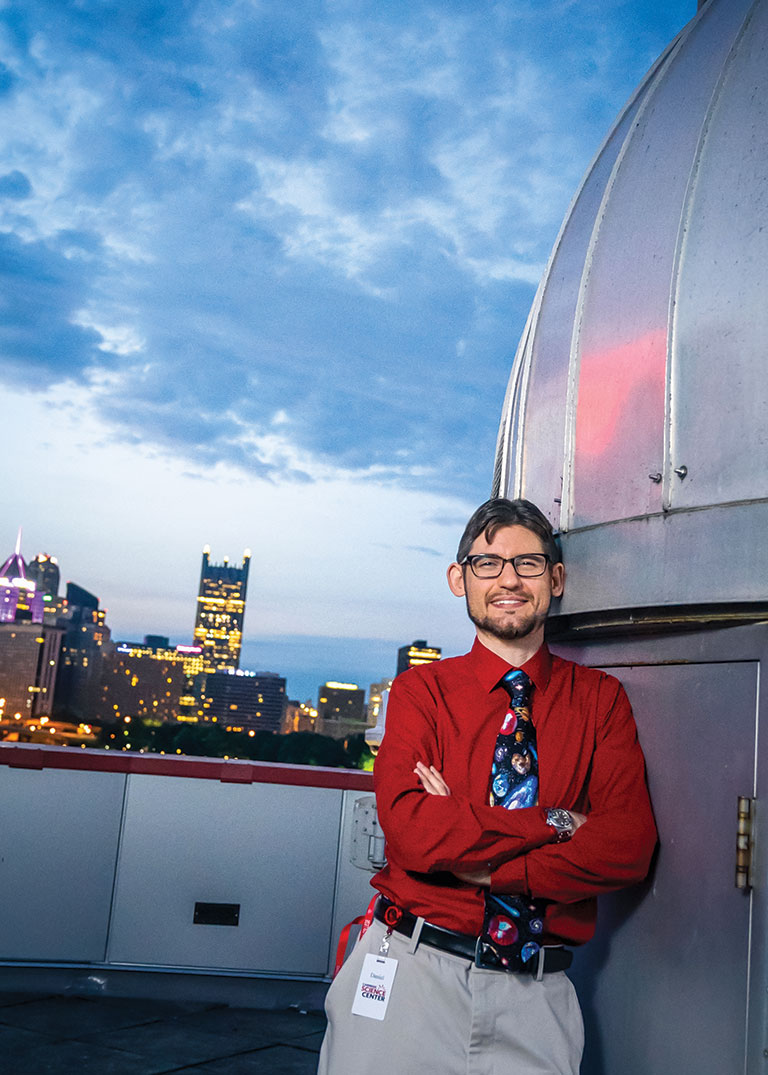
Photo by Renee Rosensteel
“Astronomy is not a secret society,” says Daniel Horenstein. “Science is for everyone, and I feel I can really make a difference here at the Science Center.“ Horenstein joined Carnegie Science Center this spring as manager of the Buhl Planetarium & Observatory at an exciting time in the Buhl’s history. Just days after Horenstein arrived, the planetarium fully reopened following a multi-phase renovation that included a new, Pennsylvania-made dome, a high-resolution projector system, accessible seating, and assistive learning devices for people with hearing and visual impairments. Horenstein came to Pittsburgh by way of California, where he taught astronomy and was director of the Tessmann Planetarium at Santa Ana College. He studied astronomy at Columbia University in New York and earned a master’s degree in physics with an astronomy concentration from Georgia State University in Atlanta, where he organized outreach telescope programming for the national White House Astronomy Night in 2015.
Q: Are there moments from childhood that you look back on as formative to your career and life path?
A: I was always into astronomy and had various telescopes throughout my life, but I really wanted to be an architect until I realized you had to know how to draw. When I was in second grade, there was a book in the elementary school library on BASIC programming language. My parents had an older computer in the basement. If I broke it, it wasn’t really a huge deal, and having that opportunity to play around and begin programming got me thinking in a logical mindset. Programming is how almost all modern astronomy is done. There’s so much data and I’m trying to see what that data is trying to tell me.
Q: What about science appeals most to you?
A: I like science because it’s both technical and creative at the same time. A lot of people think it’s cut-and-dried—do this, this, and this and win the Nobel Prize. Something I want to communicate through the planetarium is that science is a creative medium. You can express yourself through experimental designs just like you can through oil painting, ceramics, or an artistic field.
Q: How is the Buhl poised for the future with its recently completed renovations?
A: Everything in the planetarium from top to bottom is brand new. The projectors are new—10 of them work together to create a full-sky projection. We can show full-dome movies, but we also can show the night sky in greater clarity and detail from Pittsburgh or any other location in the universe. We can visit the planets and see their real terrain and we can see Earth’s terrain, cities, and even weather with data pulled daily from the National Oceanic and Atmospheric Administration. You can travel anywhere in the solar system, including Mars.
Q: How do you hope to use the Buhl to inspire others?
A: It’s amazing how many people have never looked through a telescope. People describe it as a life-changing experience. A planetarium is different, but in the planetarium it’s never cloudy and we can take tours to anywhere in the solar system. I get to make science fun and focus on being inclusive and bringing opportunities to as many people as possible.
Q: What is it about space that captivates you?
A: One of the most mind-blowing conclusions to me is the idea that the atoms inside you are directly related to cosmic processes. The Big Bang created hydrogen and helium. The stars turned on a few hundred million years after that and processed into heavier elements. Then some stars, at the end of their life span, imploded in a giant event called a supernova, and this pressure wave created all the other elements we see. So, every piece of you is traceable directly either to the Big Bang, nuclear fusion in the center of a star, or a giant explosion called a supernova. It’s an amazing connection we share between ourselves and the cosmos. We are the universe.
Q: Why is it important for us to consider life on Mars? How will the Science Center’s new Mars exhibit be important in considering our future?
A: One of the key takeaways of the Apollo era is simply to say, yes, we as humans did this impressive thing. For all of our differences on Earth, when we really put our minds together and focus on a singular goal, we can do great things. I think getting to Mars will be a new generation of that kind of moment. It’s a global endeavor, with all of humanity working toward the goal of branching out in the solar system one step at a time.
Receive more stories in your email
Sign upTags:
Facetime Q&A